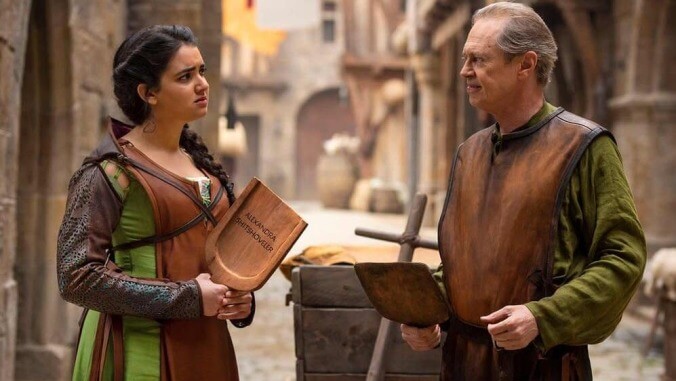There’s no God but still plenty of magic in Miracle Workers: Dark Ages


As we’ve written about elsewhere on the site, the medieval period didn’t actually represent the nadir of human civilization, despite the “Dark Ages” label created by Renaissance and Age Of Enlightenment philosophers and scholars. The Victorians, grappling with their own societal ills, pushed that “worst epoch ever” narrative further so that the hard times captured by novelists like Charles Dickens might pale in comparison. We’re not suggesting the Middle Ages, as the fifth through fifteenth centuries are now more commonly known, were a grand time to be alive—but it does make you wonder how the last 100 years will be summed up by future generations of scholars in their flying cars.
Miracle Workers: Dark Ages, the second installment of Simon Rich’s comedic anthology series, is neither a faithful recreation of the Middle Ages, nor a full-on anachronistic skewering of previous generations. Based on Rich’s short story “Revolution,” Dark Ages rolls out the usual jokes about medieval barber-slash-doctors, superstition masquerading as science, and living in a pre-plumbing society. But just as frequently, the series finds bright spots during a period that has been written off as one of the worst in human history—namely, the people who bucked convention or showed compassion or just figured out how to make disposing of waste a slightly less arduous task. The philosophical comedy may seem slight compared to The Good Place, but Miracle Workers reckons with many of the same questions about goodness and free will.
Along with the fantastic cast, it’s that faith in people that connects the second season of this anthology with the first, which was based on Rich’s novel, What In God’s Name?. Season one of Miracle Workers set up world-ending stakes in a hilariously outdated Heaven, with angels Craig (Daniel Radcliffe) and Eliza (Geraldine Viswanathan) working together to head off the apocalypse and make a disillusioned God (Steve Buscemi) invest in his creations again. One of the takeaways from that season was that people can eventually get things right—Heaven Inc. was staffed with angels who were originally human, and were now charged with looking after the planet in the afterlife.
Dark Ages shows a similar optimism, though it casts its glance back at a time and people often thought of as backwards. The roles have been changed along with the power dynamics—instead of a leisure suit-clad omnipotent being, Buscemi now plays Ed Shitshoveler, whose last name is also his vocation. Radcliffe has traded Craig’s uniform for Prince Chauncley’s royal raiments and a much more powerful position. Viswanathan is now Alexandra (or Al) Shitshoveler, daughter and co-worker of Ed. Like Karan Soni’s Lord Vexler, Al is a striver, pushing to improve her standing in life and that of others. Other returning cast members include Lolly Adefope, who plays novitiate Maggie (who’s also Al’s best friend), and Jon Bass as Al’s goofy brother Mikey.
This time around, there’s no shared goal like staving off the end of the world—surviving the “Dark Ages” is a big enough challenge on its own. As a result, the storytelling is more episodic than before, jumping between character POVs but finding common threads throughout. Al and Chauncley both question their predetermined paths as their fathers Ed and King Cragnoor (a foreboding Peter Serafinowicz) try to hand down their traditions. What remains firmly in place are the gut-busting visual gags—keep an eye on the signage—along with the ability of Rich and his cast to turn the most mundane of interactions and common of setups into magic: Chauncley’s first internship sparks a surprising number of fires, while Al’s first day of school is more depressing than most.
Just as he contorted himself playing a neurotic office drone in season one, Radcliffe throws himself into playing the evolving fool, his blissfully ignorant smiles gradually giving way to empathy and greater self-awareness. Viswanathan shines just as brightly as a determined dreamer who must face up to her own arrogance. They’re the de facto leads, but Dark Ages leaves just as much space for the aspirational Lord Vexler to reflect on his climb through social strata and for Maggie to realize that, unlike her bestie, she may have already found her calling in life. Mikey is a bit more of a wild card, but he’s grounded by Ed, who’s a more enlightened parent than most sitcom dads (or moms).
Miracle Workers: Dark Ages could have easily fallen into medieval parody, giving viewers who might think they’re, as Al notes, currently living through a “particularly dark time in history” a chance to feel a little better about our present circumstances by looking back on an even bleaker period. But as the season goes on, the tone and jokes become more contemporary, building a bridge to the past. What season two of this delightfully absurd anthology series proves is that there’s no need for miracles in the Dark Ages when we have each other.